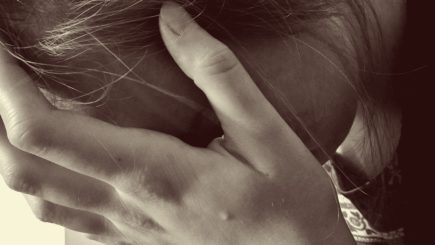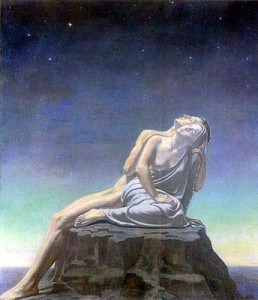A Call to Protect the Full Personhood of Our Daughters from Both Pornographic and Spiritual Patriarchy
The word “misogyny” may scare some away and sound like inflammatory jargon, but it is alive and well in our world and something we as parents need to guard against. I am distressed by the pervasive, addictive, and debasing influences of Internet pornography that invisibly unleashes into our culture a surge of very real, embodied misogyny. This misogyny is disfiguring our boys’ and our girls’ emerging sexual identities, putting girls at greater risk of being mistreated in myriad ways as submissive sex objects—not just by the pimps and johns and traffickers but right in the fabric of their everyday relationships.
As Gail Dines, professor of sociology at Wheelock College, Boston, Mass., and founder of Stop Porn Culture describes,
We are in the midst of a massive social experiment, one that is reshaping the lives of young people all over the globe. Never before have children and youth had easy access to hard core porn based on the degradation, debasement, and humiliation of women. What was considered hardcore twenty years ago, at the dawn of the Internet era, has now become mainstream. Most images on mainstream porn sites today depict sexually violent, body-punishing sex that dehumanizes women and men alike.
I’d rather turn my head and not think about such an unsavory topic, but as a mother of two adolescent boys and a 12-year-old girl, I cannot turn a blind eye and accept as “normal” this powered-up, dangerously preeminent form of masculinity that is warping our human relationships. This is not just a “feminist” concern; it is a humanitarian concern and a massive public health threat with both a pornographic and a spiritual face.
Misogyny and Patriarchy

Misogyny means “disdain for females” and is a centuries-old, deeply rooted ideology/mindset that has been stamped into the human psyche. It takes the full, complex, multi-faceted, distinctive personhood of male and female human beings and debases it into a master/slave, superior/inferior way of relating. Patriarchy is a term that can be softened and moderated in tone, but whatever language, imagery, or ideology it comes wrapped in, at its core it sees the masculine as owner and the feminine as a resource to be controlled, transacted, and mastered. Whether in strip clubs on Route 1 in Boston, in the sex trade that takes place around sporting events worldwide, or in child brides married off to older men in places like Africa, the currency of patriarchy is the power imbalance created by economic, spiritual, and physical vulnerability and social norms that in myriad forms prop up male hegemony as “just the way things are.”
The word “patriarchy” comes from the Greek patria (father) and arché (rule), and it literally means “male rule.” It refers to a society in which men hold all positions of power and the father rules the family as a microcosm of the king’s divine right to rule the social/political structure and God the Father’s rule of the “kingdom” of the world. It is a simple reality that for centuries females were not treated as full human beings but something along the continuum of perpetual minor to be governed, property to be owned, or slave to be mastered.
At least in the Western world, we have collectively moved away from this patriarchal social structure in our contemporary ideals of human rights and equality, yet this ancient code of male preeminence/female subjugation continues to lurk in our lived social norms and religious ideals, disfiguring the oneness and harmony we were created to enjoy as equally dignified, empowered human beings. I want to shield my children from all that reduces them and their God-given sexuality to anything resembling this harmful duality, which substitutes the intimacy and connection they were created for with hierarchy and which is an affront to our collective human dignity and to our Creator, in whose image we are all—male and female alike—created.
There is reason for hope in the form of a global humanitarian movement centered on empowering the girl child. Yet the misogynistic forces in our world exert a perpetual undertow bent on undermining the progress so many are working so hard to achieve. Human rights are never “won” once and for all. They need to be continually safeguarded and struggled for, again and again. The human proclivity to consolidate one’s own power over others will always be with us. Particularly when it comes to gender equality, it seems to be a truism that if we are not moving forward toward a more level social structure, we will easily slide backwards. If we care about our girls’ futures, all of us have a role to play in creating a more gender-balanced world where they can presume a level footing in society. We have come a long way in breaking one glass ceiling after another, but everywhere in our world regressive forces are bent on taking us right back to the Old World master/slave, superior/inferior social structure.
Whether in Nazi Germany, under apartheid in South Africa, under Jim Crow laws in the antebellum South, or in the neo-patriarchal Husband/Father-is-Prophet/Priest/King-of-the-Home “family-integrated” church/homeschool/start-up church movement right here in the US, when you diminish a group as inferior, as lower status, you render them vulnerable to abuse.
Spiritual and Sexual Abuse: A Public Health Threat
If we take off our rose-colored glasses, we can see that an underbelly of our society is still saturated with this debased, disempowered view of females. The misogyny of our “pornified” culture, as author Pamela Paul dubbed it, is so unnervingly normalized and so completely permeates the airwaves we all breathe that good humans absorb it and partake in it and become themselves debased by it. At their core, all forms of sexual abuse and diminishment are about power, and as we see in any form of political or social tyranny and very vividly in pornography and in sex shacks like this, unilateral power is not what we are made for and in fact debases the humanity of both the perpetrator and the victim.
The gender-based public health threat that Dr. Dines describes is not caused by some accident of nature or contagious disease but by ideas and attitudes that influence how we live and move in the world and how we exercise power and agency in our male/female relationships. Internet pornography depicts women (and girls) being treated worse than animals and with language (“Whore, you like it”) that stunts the empathy of males and fuels the debased fantasy that this is the way females want to be treated. A 2010 study analyzing pornographic scenes found that “88.2% contained physical aggression, principally spanking, gagging, and slapping, while 48.7% of scenes contained verbal aggression, primarily name calling.”
My research on theologians and church fathers whose misogyny has warped the trajectory of Christianity has brought me to some disturbing conclusions. I am struck with how similar in flavor and sentiment the vile pornographic images that thrive on the Internet are to the words of utter debasement and disdain for females uttered by some of our church fathers. How could it be that pornographers and men of God speak such a similar language?
With my ear to the ground, my philanthropic mind and heart engaged, I continue to discover an extremely authoritarian, patriarchal gender role ideology in the evangelical Christian world all around me, which alarmingly mirrors Dr. Dines’ observations of the pornography industry, where the “hardcore” extreme has become mainstream. I have been in the evangelical world my whole life but have never before heard such enthusiastic calls for men to “step up” and be quasi-sovereigns in the family, in the church, and in society. At every turn I encounter exalted metaphors calling for consolidation of power into the hands of fathers/husbands in their families and men in the church and parachurch organizations.
In this ideology that is gaining a foothold in many Christian circles (not just in homeschooling families), we see the growing use of the word “patriarch” and an emphasis on training girls to be girls (which means being submissive and pure and honoring her father as the family priest) and boys to be boys to “step up” throughout their childhood and progress into the role of becoming a patriarch. Study after study shows that highly patriarchal religious environments, where girls are conditioned little by little to subordinate their own wills to their father or pastor (who represents God), lead to such a loss of human agency, so that they have a hard time even knowing that abuse is wrong, never mind standing up to it.
The more you start digging into the interconnecting web of these very charismatic, mostly Reformed, male-rule church planters and “home education/family discipleship” leaders (who literally describe themselves to their flocks as “prophets, priests, and kings”) the more you see a growing totalitarian-like leadership ethos which is leading to charges of both spiritual and sexual abuse.
Patriarchy Codified
You also see scandal after scandal erupting within Christian ministries, highlighting vividly the connection between the patriarchy movement and a pattern of abuse of power not only in sexual relationships but also in church governance and other social relationships. One recent example is former leader of Vision Forum, Douglas Phillips, who is facing a lawsuit from a woman who claims he treated her as a “personal sex object” while she worked for his family. A second and even more disturbing example is former leader of Institute in Basic Life Principles (IBLP), Bill Gothard, who resigned earlier this year after at least 34 women accused him of making unwanted sexual advances.
Fred Clark describes this ideology of “family priesthood” that falls heavily on both wives and daughters: “They believed that the relationship between husband and wife was basically the same as that between a king and his subject. Gothardism also placed daughters under the totalitarian reign of their fathers until the day they married someone else, at which point they traded one king for another.” He goes on to joke, “My dad had zero patience for those folks. He liked to repeat a joke about Bill Gothard teaming up with Bill Bright to rewrite Campus Crusade’s famous Four Spiritual Laws tract so now it says, “God loves you and has a horrible plan for your wife.”
One of the women who spoke out about Gothard is Vykie Garrison. “It’s not an exaggeration to compare IBLP ideals to the Taliban,” she stated, “because, as far as women go, we are reduced to non-personhood status.”
Now 44, she became a part of Gothard’s IBLP in her mid-20s and followed its teachings until one of her daughter’s attempted suicide. She divorced her husband and left the Institute at the age of 41 and now writes about her experiences on the blog “No Longer Quivering,” where countless women describe very similar stories about how their husband’s role as divine ruler of the family left them totally powerless in the face of abuse and with their confidence dwindling away.
Gothard has had abuse scandals surrounding him for decades, but he seems to have nine lives. In a Time magazine article written over 30 years ago, Gothard, then 39, was quoted as advising women victims of domestic violence to pray, “God, thank you for this beating.” His influence on the evangelical world has been deep and wide for over 20 years. Many organizations have distanced themselves from him, but his dangerous and theologically skewed ideas of male preeminence and “priesthood” in the family remain.
Check out the Christian Patriarchal Watch List to get a glimpse into all of the spiritual/sexual abuse scandals in this movement.
Clark’s description of Gothard’s imprint on Cru is a window into how this world of extreme Christian patriarchy, centered around this growing highly Old Testament-based “triperspectival” theology/ideology of leadership, is extending its reach out into the larger evangelical world. I know many great people who work in Cru and love much of what they do to support the spiritual growth of college students. The campus side of Cru has actually made great strides in gender balancing its organization and allows women to serve/lead at all levels of the organization. However, when it comes to teachings about marriage and family, it is steeped in this ideology of husband/father as the family prophet/priest/king and is laced with parenting advice about is so disempowering to girls and young women. Most of the college women they serve would be horrified to read the ideas the ministry espouses about raising sons to be patriarchs who rule and “disciple” their wives.
According to Garrison, IBLP “gets its hooks into evangelical parents” by offering them a program for homeschooling their children “to protect them from the evils of public schools,” and from there the patriarchal training gets woven into the whole family structure. She goes on to describe the effects of the patriarchal ideology on her own family:
There’s such a focus on this patriarchal teaching that the husband is the head, he is the leader, the wife is to submit, the children are to obey. It turned my husband into a tyrant. He had the idea in his head that as our spiritual covering he had a responsibility for my spiritual life, our children’s spiritual life. And if he feels like he’s the one who’s ultimately going to answer to God, he has the authority and the responsibility and the obligation to use so much control over all our actions, down to our thoughts and beliefs.
If you think of patriarchy in all its forms, both pornographic and religious, as a continuum of male entitlement to “rule,” there are many points along the spectrum where girls (and women) capitulate to demands that are not what they really want and that are not honoring of their full personhood. As partakers in a culture, we all want to “belong” and fit in. It can be hard for girls to tune out messages from both the “tribe” of pornified pop-culture and the “tribe” of religion to sort through how to chart their course as a female human being in a world that is still steeped in patriarchal attitudes. On one end of the spectrum, there are girls with strong inner and outer supports who refuse to conform and become reduced to a “role,” either sexually or religiously. On the other end is total capitulation to sexual abuse in any of its myriad forms, which can literally become like slavery right in the confines of a home or within the web of sex trafficking that spans the globe.
It Is for Freedom…
It takes courage to say “no”to a social norm that governs how we relate as male and female. It is hard for a girl growing up in a patriarchal setting to stand up and say, No! The God I love and believe in, and my own soul, do not tell me that I am meant for this subordinate “place” in the world. Likewise, it can be hard for a girl who grows up learning to be submissive to patriarchy to say, No! I will not let you do that to me. No! I will not wait around for a man to “lead” me or represent me before God. No thank you, I own my own life path. My Creator gave me my own soul and I, like you, am created not to be governed or have anyone mediate my relationship with God, but to live in healthy mutuality with God, self, and others. My soul, like yours, was created to be free, created to sail its own little ship, to do its own unique work in the world. I will chart my course bravely in the world and walk humbly with my Creator and with others, but with my head held high.
Let’s stand up as adults for our sons and daughters and try to clean up any patriarchal litter that crosses our path, whether in our churches and parachurch organizations or in the unsavory images which are just one click away from our kids’ hearts and minds. The work of creating a more gender-balanced world is not a “women’s issue.” It is a human issue, and it is the job of all of us as co-image bearers of God sharing this planet created to partake in the beautiful duet of masculine and feminine in our world: Adam and Eve, side-by-side, as partners, walking through life, humbly with one another and with our Creator, who knows our gender struggles and understands but wants more for the human family. We are brothers and sisters in God’s family. We are not from separate planets, as some suggest. We are different, yet the same, are we not? We see the beautiful capabilities and range of qualities that both our sons and our daughters possess.

Let’s end on a high note with a benediction from Scripture that reminds us of our shared, fallen human proclivity, again and again, to elevate ourselves as preeminent over others. Likewise, let us abandon our penchant for trading our own freedom and reverting backward to the yoke of slavery,which is not our true nature as daughters and sons of our Creator, all “priests” in God’s economy, where all hierarchies are level. Hear these words now as a prayer for our girls and ourselves to roll up our sleeves and enlist the highest and the best of faith to help our world clean up its gender messes and create the gender-balanced world that we all deserve as people set free.
“It was for freedom that Christ set us free; therefore keep standing firm and do not be subject again to a yoke of slavery” (Gal. 5:1).
May it be so.
Emily Nielsen Jones is a donor-activist engaged in promoting human equality, justice, and peace around the world. She is particularly passionate and engaged in the nexus of faith, gender, and development and working to mobilize our faith traditions to more fully and unambiguously embrace gender equality. Emily is actively engaged in the women-led philanthropy movement, and is the author of numerous articles. She is the recipient of the Christians for Biblical Equality 2013 Micah Award and was named a 2014 Women’s eNews “21 Leaders of the 21st Century” honoree. Read our PRISM profile of Neilsen Jones.


